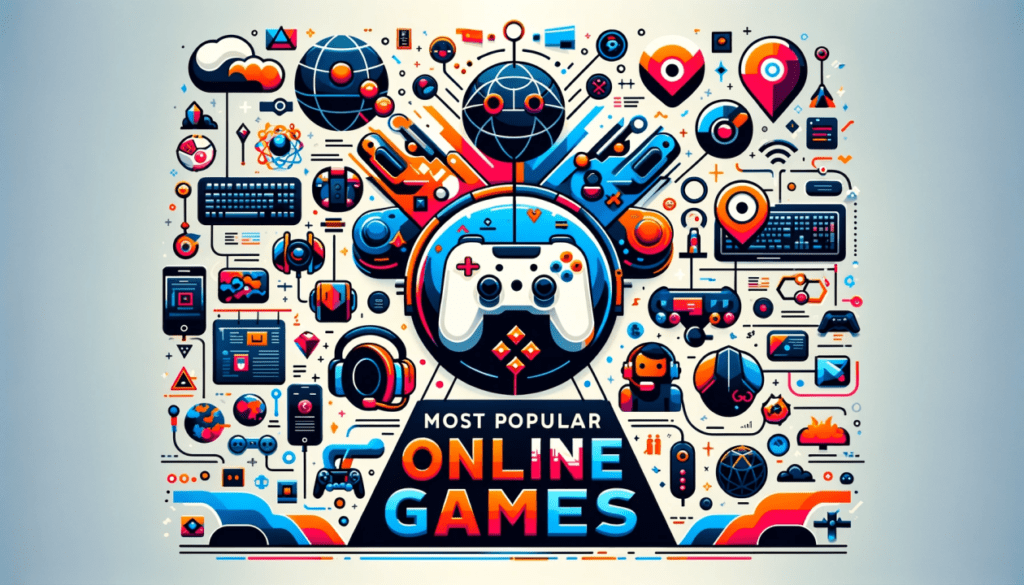The digital gaming industry has undergone significant transformation in recent decades, shifting from basic pixelated games to highly engaging experiences worldwide. In contemporary society, online games have emerged as a prominent component of popular culture, facilitating global connectivity among a vast number of players hailing from many geographical locations. This analysis delves into the ten most renowned Popular Online Games , examining their influence, gameplay mechanics, and the corresponding communities that have emerged in their wake.
1. Fortnite
Fortnite, an online game created by Epic Games and launched in 2017, rapidly gained widespread popularity on a global scale. The game’s distinctive combination of survival, shooter, and construction features, along with its optional Battle Royale mode, has engrossed a wide range of players. Fortnite is notable for its vibrant and animated visuals, as well as its frequent upgrades that offer novel material, so ensuring the game remains dynamic and captivating. The cultural influence of the game is indisputable, as evidenced by its inclusion of in-game concerts and partnerships with renowned properties such as Marvel and Star Wars.
2. League of Legends (LoL)
League of Legends, a prominent online multiplayer battle arena (MOBA) game, has been developed by Riot Games. From its inception in 2009, the platform has consistently maintained its position as a leader in the field of esports, attracting a substantial number of participants and spectators to its competitive competitions. League of Legends (LoL) is widely acclaimed for its strategic intricacy, extensive array of champions, and dynamic gameplay, necessitating a combination of individual prowess and collaborative teamwork.
3. Minecraft
Minecraft exemplifies the potency of simplicity and ingenuity. The sandbox game, developed by Mojang in 2011, provides players with the opportunity to construct and navigate virtual environments composed of blocks. The survival and creative modes of the game accommodate various play styles, while the multiplayer functionality facilitates player interaction and collaborative creation. The educational potential of Minecraft has been acknowledged, positioning it as a valuable tool for facilitating learning and fostering personal growth.
4. PlayerUnknown’s Battlegrounds (PUBG)
The Battle Royale genre gained significant popularity through the efforts of PUBG Corporation. Introduced in 2017, this game provides a more authentic survival encounter, as players gather resources and engage in combat to become the final one to survive. The popularity of the product has resulted in the development of variants for many platforms, including mobile, which has greatly increased its accessibility.
5. World of Warcraft (WoW)
World of Warcraft, which was launched by Blizzard Entertainment in 2004, has emerged as a quintessential example of a Massively Multiplayer Online Role-Playing Game (MMORPG). World of Warcraft has meticulously constructed a vast fictional realm, Azeroth, replete with stories, quests, and dungeons. The community of this game is highly committed, since players establish enduring connections through guilds and raids.
6. Counter-Strike: Global Offensive (CS:GO)
CS:GO, developed by Valve Corporation, plays a crucial role in the realm of competitive online shooters. Introduced in 2012, it upholds the tradition of the Counter-Strike franchise through its precise, strategic gameplay and a significant focus on collaboration. The esports sector in CS:GO is strong, with a multitude of high-stakes competitions taking place each year.
7. Among Us
The song “Among Us” by Innersloth garnered significant global attention in 2020, despite its first release in 2018. In this multiplayer game centered around deception, participants collaborate on a spacecraft, while impostors attempt to undermine their endeavors. The game’s straightforward mechanics, coupled with its incorporation of psychological mind games, have contributed to its widespread popularity among casual players and streaming platforms.
8. Apex Legends
Apex Legends, developed by Respawn Entertainment, Apex Legends is a multiplayer shooting game that places a strong emphasis on teamwork through the use of distinct character abilities, known as Legends, which serve to foster diverse playstyles and strategic approaches. Since its unexpected launch in 2019, Apex Legends has established a prominent position within the gaming world, renowned for its dynamic action sequences and refined gameplay mechanics.
9. Roblox
Roblox, developed by Roblox Corporation, serves as a comprehensive platform that facilitates the creation and dissemination of user-generated games. Established in 2006, it has cultivated a substantial, predominantly youthful demographic, providing a wide array of activities spanning from simulations to obstacle courses. Its focus on innovation and interpersonal engagement sets it apart as a distinctive addition to the realm of online gaming.
10. Valorant
The Valorant of Riot Games Valorant, a tactical shooter game, was launched in 2020, incorporating many components derived from CS:GO and hero shooters such as Overwatch. The game has rapidly garnered attention within the competitive realm, receiving acclaim for its strategic gameplay, diverse range of characters, and well-balanced mechanics. Valorant embodies the forthcoming cohort of tactical shooters, characterized by an expanding community and a notable presence in the realm of esports.
Each of these games has had a substantial influence on the online gaming industry. Not only have they offered extensive periods of amusement, but they have also facilitated the formation of communities, ignited creativity, and even initiated professional paths in the realms of gaming and esports. The ongoing development of online games persists, as these titles establish new standards for innovation, user involvement, and cultural influence. By creating expansive virtual environments, engaging in competitive gameplay, and fostering social connections among players, these games have transcended just recreational activities and have become an integral component of contemporary digital culture.
